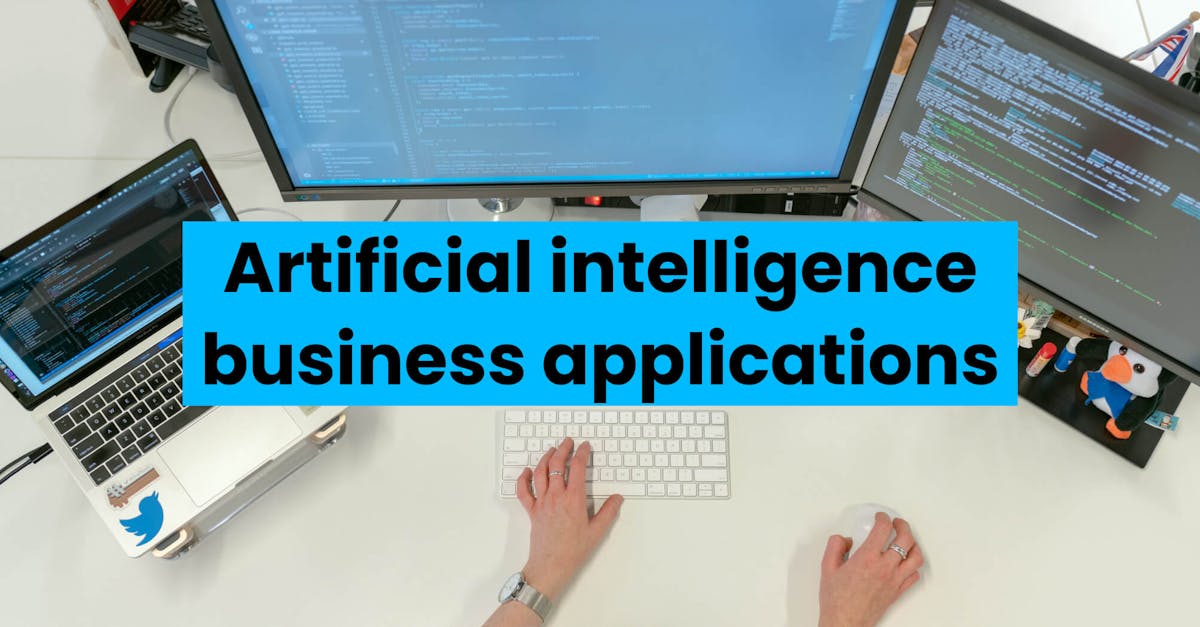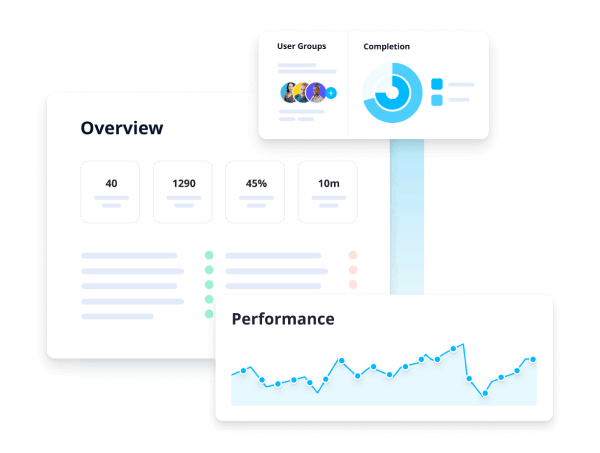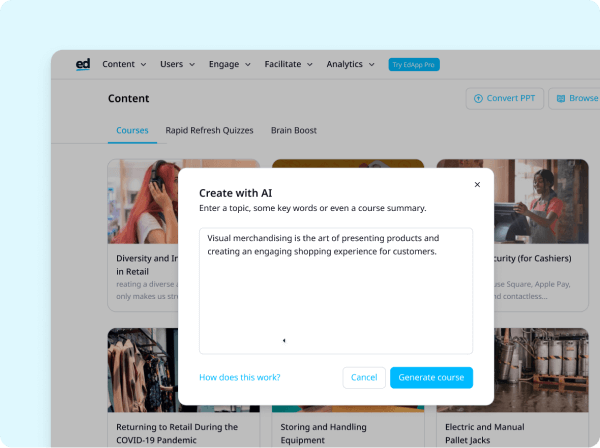Top 10 business applications of artificial intelligence
Published
December 4, 2023
Author
Share

EdApp has the best artificial intelligence business applications for corporate L&D
Get started for FREE
Technological innovation pushes artificial intelligence (AI) to emerge as a transformative force in the business landscape of various industries. This article explores some artificial intelligence business applications, showcasing how AI is reshaping traditional practices.
From automation and customer service to marketing, finance, and beyond, AI's versatile capabilities are ushering in a new era of intelligent business solutions.
How can AI be used to help businesses?
Artificial intelligence business applications include automating repetitive tasks, enhancing efficiency, and coming up with valuable insights from data analysis. It can also take charge of tasks in various fields such as customer service, marketing, finance, and operations.

AI-driven technologies such as machine learning and natural language processing empower businesses to streamline processes. With these tools, businesses can make data-driven decisions, improve customer experiences, and enhance overall performance.
Plus, with predictive analytics, AI aids in forecasting trends, identifying patterns, and mitigating risks to let businesses stay competitive in a rapidly evolving digital landscape. Let’s explore all of this and more in the following list of artificial intelligence business applications.
Artificial intelligence business application #1: Corporate training and development
AI in business plays a pivotal role in transforming corporate training and development by offering personalized learning experiences tailored to individual needs.

Through the analysis of employee performance data, AI identifies skill gaps, allowing organizations to design targeted training programs that address specific areas for improvement.
Adaptive learning platforms powered by AI adjust content and difficulty levels based on learners' progress, boosting engagement and knowledge retention.
Virtual reality (VR) and augmented reality (AR) applications create immersive training environments that are particularly useful for hands-on skill development.
AI-driven chatbots and virtual assistants also give instant support and feedback, while predictive analytics offer insights into the effectiveness of training modules. This facilitates continuous learning and improvement.
EdApp's AI can also elevate your business's corporate training and development initiatives by offering personalized and adaptive learning experiences.
Through sophisticated algorithms, you can analyze individual learner data, identifying strengths and weaknesses to tailor training content accordingly. This artificial intelligence learning app also has an AI Translate feature. It translates courses into your team's preferred language in minutes with just the click of a button. You can choose from over 100 languages, so there's no need to wait weeks for revised content!

There are also features such as a performance dashboard, completion certificates, and assessments for an engaging and effective learning environment. And with EdApp’s AI Create, you can create training content in a flash. Just have your topic ready and witness the app generate complete lessons right before your eyes.

Overall, Edapp's AI not only boosts the efficiency of corporate training programs but also fosters continuous learning and development.
Sign up for EdApp for the best artificial intelligence business applications for corporate training and development.
Artificial intelligence business application #2: Automation and robotics
By using machine learning algorithms and advanced data analytics, AI facilitates the development of intelligent automation systems. These systems streamline and optimize repetitive tasks, leading to increased operational efficiency and reduced costs.

In manufacturing, AI-driven robots enhance precision and speed, improving production processes. Supply chain and logistics benefit from AI with intelligent decision-making in inventory management, route optimization, and order fulfillment.
Artificial intelligence in business also empowers robots to adapt to dynamic environments, improving their flexibility and usefulness across various industries.
The integration of AI in automation and robotics not only accelerates processes but also contributes to increased productivity. This allows businesses to stay competitive in a rapidly evolving market.
Artificial intelligence business application #3: Customer service
AI elevates customer service by introducing intelligent solutions that streamline interactions and improve user experiences.

Through the implementation of AI-powered chatbots and virtual assistants, businesses can now give instant and personalized responses to customer queries. These address issues efficiently and maintain 24/7 support.
Natural Language Processing (NLP) allows these systems to understand and respond to diverse customer inputs for a more human-like interaction. AI also analyzes customer data to anticipate needs, allowing for proactive assistance and personalized recommendations.
This way, AI not only boosts responsiveness and accessibility but also plays a key role in cultivating positive customer relationships, driving satisfaction, and fostering brand loyalty.
Artificial intelligence business application #4: Marketing and sales
Machine learning algorithms analyze datasets to identify customer behavior patterns. These empower businesses to refine their marketing efforts and target specific audience segments.

AI-driven recommendation engines further enhance the customer experience by suggesting products or services based on individual preferences. These increase cross-selling and upselling opportunities.
Predictive analytics also helps forecast market trends and enhance pricing strategies. Plus, automation in email marketing, chatbots for instant customer engagement, and AI-powered content creation all contribute to more efficient and targeted marketing campaigns.
Artificial intelligence business application #5: Data analysis and insights
Artificial intelligence uses advanced data analytics to derive meaningful business insights. Through machine learning algorithms, AI can process and analyze large datasets at unprecedented speeds, uncovering patterns, trends, and correlations that may be otherwise overlooked.

This empowers businesses to make informed and data-driven decisions, streamline operations, identify market opportunities, and mitigate risks. Predictive analytics also forecast future trends, allowing businesses to proactively adapt strategies.
AI best practices enhance business intelligence by offering real-time analytics, which helps organizations stay agile and responsive in a rapidly changing environment. In essence, AI-driven data analytics lets businesses foster a competitive edge and drive innovation with powerful insights.
Artificial intelligence business application #6: Finance and banking
AI offers invaluable assistance to the finance and banking sectors by giving advanced capabilities in data analysis, risk management, and customer service.

Machine learning algorithms allow for accurate credit scoring by assessing a multitude of variables. This enhances lending decisions. So it’s now possible to get instant business loan approval, rather than having to wait hours, days, or even weeks for the green light to be given. At a time when cash flow is limited and you need an injection of capital to take advantage of time-sensitive market opportunities, this type of tech can be a real boon. And in fraud detection, AI analyzes transaction patterns in real-time, swiftly identifying and preventing suspicious activities.
AI-driven chatbots and virtual assistants also improve customer service by handling routine queries, facilitating smoother interactions, and offering personalized financial advice. Automated financial analysis powered by AI contributes to more informed investment decisions.
Artificial intelligence business application #7: Human resources
In recruitment, AI algorithms analyze resumes, conduct initial screenings, and identify suitable candidates, expediting the hiring process. AI-driven tools also help in employee onboarding, offering personalized training plans based on individual skill assessments.

Sentiment analysis can also enhance employee engagement, with AI monitoring employee feedback and contributing to a positive workplace culture. AI even facilitates performance management by delivering real-time feedback and identifying areas for improvement.
Predictive analytics in HR helps forecast workforce trends, allowing for proactive talent management strategies. Overall, AI in HR optimizes recruitment, training, and employee management so that businesses can build a skilled and engaged workforce.
Artificial intelligence business application #8: Healthcare
Artificial intelligence business applications analyze large amounts of data from various sources, such as medical images and patient records. This aids in the early detection of diseases for more accurate diagnoses.

AI-driven analytics also contribute to personalized medicine by assessing patient data to tailor treatment plans and predict potential health risks.
NLP facilitates the extraction of valuable information from clinical notes and research literature, helping in medical research and decision-making. HIPAA compliant chatbots and virtual health assistants also improve patient care and offer instant responses to healthcare inquiries.
Artificial intelligence business application #9: Cybersecurity
AI boosts cybersecurity for businesses with advanced threat detection, prevention, and response capabilities. It analyzes datasets to identify patterns and anomalies in network behavior for the rapid detection of potential security threats.

AI-driven security systems can adapt and learn from new threats, enhancing their ability to recognize and mitigate evolving cyber risks. Predictive analytics also helps in anticipating and proactively addressing vulnerabilities before they’re exploited.
Plus, AI helps to automate routine cybersecurity tasks, allowing security teams to focus on more complex threats. The integration of AI in cybersecurity not only fortifies a business's defense mechanisms but also offers a proactive and adaptive approach to countering cyber threats.
Artificial intelligence business application #10: Operations and maintenance
Through predictive maintenance, AI analyzes historical data and patterns to predict when equipment is likely to fail. This allows for proactive maintenance and minimizes unexpected disruptions.

Quality control in manufacturing benefits from AI applications by making sure that products meet specific standards through real-time monitoring and analysis. AI analytics also enhance supply management by tracking inventory, streamlining warehouse logistics, and improving demand forecasting.
There’s also workflow automation to reduce manual intervention in routine tasks and to free up resources for more strategic initiatives. This way, AI increases reliability and empowers businesses to have cost-effective operations, improving their competitive edge in the market.
Author
Donna Dane
Donna is an elearning content writer for SC Training (formerly EdApp), a mobile-based microlearning platform designed for today's digital training needs. When she's not writing web articles, she writes lines of code or songs or anything food-related.
